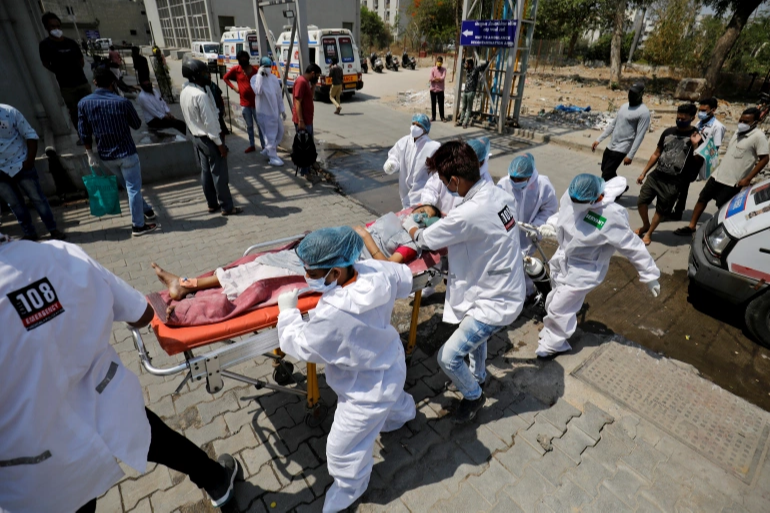
Brasilia, April 21 (RHC)-- Doctors have warned of a surge of new COVID-19 cases around the world despite the ongoing vaccination campaigns in many countries. India and Brazil, which reported the highest number of confirmed new infections, have been hit the hardest.
Brasilia, April 21 (RHC)-- Doctors have warned of a surge of new COVID-19 cases around the world despite the ongoing vaccination campaigns in many countries. India and Brazil, which reported the highest number of confirmed new infections, have been hit the hardest.
India's Health Ministry on Wednesday reported 2,023 deaths in 24 hours and 295,041 new cases. Hospitals in the country scrambled to shore up medical equipment as oxygen supplies ran short amid rising demand for beds. The number of cases in India exceeded 15.6 million, and total deaths reached 182,553.
In Brazil, 69,381 of new COVID-19 cases were reported in the past 24 hours, bringing the nationwide tally to over 14 million. The Brazilian Health Ministry said that 3,321 more deaths had been registered, raising the national death toll to 378,003.
Brazil has the world's second-highest COVID-19 death toll, after the United States, which has 568,000 deaths, and has the third-largest caseload, after the US, with nearly 32 million cases, and India, with about half that.
Meanwhile, South Korea's Foreign Minister Chung Eui-yong asked the U.S. to help the country address its COVID-19 vaccine shortage and thereby return a South Korean favor of sending test kits and masks to the US earlier in the pandemic. The request comes as the South Korean government has come under pressure for not doing enough to secure enough vaccines. Just 3% of its population has been vaccinated due to global hoarding of supplies by rich countries and little access to vaccines by others.
"We have been stressing to the US that 'a friend in need is a friend indeed,'" Chung told reporters at the Kwanhun Club, a representative association of journalists in South Korea. He said South Korea had airlifted Washington a large volume of coronavirus test kits and face masks in the early stages of the pandemic even as the domestic supply was very tight. "We are hoping that the US will help us out with the challenges we are facing with the vaccines, based on the solidarity we demonstrated last year," he said.
Elsewhere, in Sri Lanka, where free vaccines were supplied by India, medics found six cases of blood clots among the recipients of the AstraZeneca COVID-19 vaccine, three of whom have died. Nearly a million people have been given the first dose of the Indian-made vaccine in the country.
In Japan, the government is considering declaring a state of emergency for Tokyo and Osaka Prefecture as new COVID-19 cases surge in those areas. A number of domestic media outlets reported that the Japanese government was expected to declare the state of emergency for the capital and Osaka Prefecture this week, as well as for Hyogo and Kyoto prefectures.
If adopted in all the four regions, the emergency measures would cover close to a quarter of Japan's population of 126 million. Japan has so far avoided the kind of explosive spread of the pandemic that has plagued many Western countries, with total cases so far numbering at about 540,000 and a death toll of 9,707. But the latest rise in infections has stoked alarm, coming just three months before the planned start of the Tokyo Olympics and amid a sluggish vaccination roll-out.
Many African countries, already facing a shortage of affordable vaccines, are being stunned by the unprecedented scale of the distribution challenge when doses do arrive. Authorities do not have enough equipment like masks and cotton wool because of funding shortfalls that could total billions of dollars, according to more than a dozen health experts and some internal government documents seen by Reuters. They also lack sufficient personnel and training to distribute vaccines at short notice.
The African country of Ghana received 50,000 COVID-19 vaccine doses from India last month, but it failed to use them because it did not have enough trained staff to distribute them. The country was still rolling out shots received in late February from the global vaccine-sharing scheme COVAX, and didn't have the capacity to expand that operation, according to the head of Ghana's immunization program.
The additional doses were put in cold storage in the capital, Accra.
The problems faced by Ghana, one of sub-Saharan Africa's more economically developed nations, illustrate the problems in several other countries on the African continent being not prepared to inoculate people against this pandemic.
The COVID-19 disease is caused by SARS-CoV-2, the novel coronavirus that emerged in December 2019 in Wuhan, China. It has caused 3.01 million deaths around the world as well as lasting health problems in some who have survived the illness.

